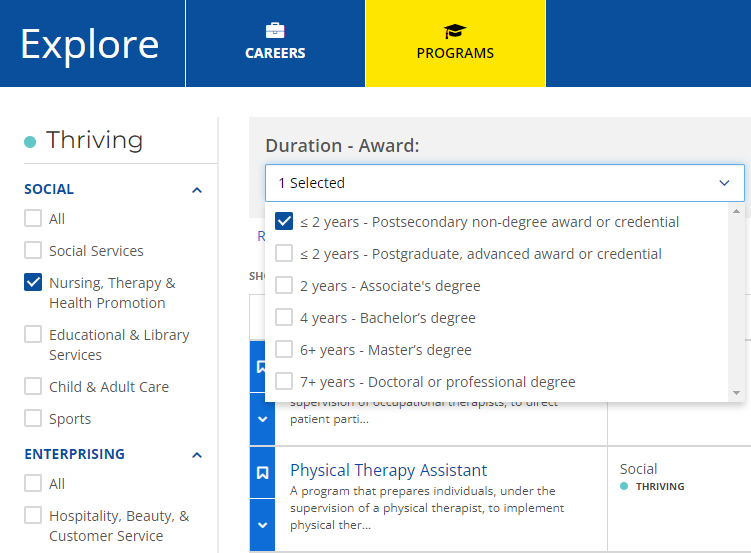Holland code assessment and RIASEC
Holland Code and RIASEC: What are Holland Codes?
The term Holland Code, Holland Codes and abbreviation RIASEC refer to John Holland's six personality types: Realistic (R), Investigative (I), Artistic (A), Social (S), Enterprising (E) and Conventional (C). According to Holland’s Theory of Career Choice, choosing work or an education program environment that matches, or is similar to your personality, will most likely lead to success and satisfaction.
Watch Dr. Jones, Career Key’s founder, explain Holland’s Theory. Career Key has been the expert on Holland’s Theory and related career advice for over 25 years.
How do you use Holland Codes to choose the right career path?
These codes are used to make personality-career and personality-major matches, which increase job satisfaction, job performance and academic success. To learn more, visit our article on Holland's Theory of Career Choice. Our advice on career change, how to choose a career path and how to choose a major are all based on this popular, respected theory.
What’s the biggest mistake you can make in using Holland Codes?
Oversimplication: You are not just a 3-letter RIASEC Code
You are not just 3 letter Holland Codes. You are not just a series of letters. People compare Holland’s Theory to Myers Briggs and other assessments where you take an assessment and get assigned a multi- letter code. This is not a true reflection of the theory’s richness and value.
Holland’s Theory is a people theory, not a code theory
At its core, Holland’s Theory is about person-environment fit, not shoehorning people into boxes. As Career Key’s founder Dr. Lawrence K. Jones puts it, “birds of a feather flock together.”
This popular career development theory has been a big target for oversimplification and dehumanization. This is not to say that Holland Codes do not have their use – they do. For some people it is a great method, and in the early days it was the original and only method for matching personality with careers and later, college majors.
Where 3-letter codes break down is in the user experience area, when people do not interpret their codes properly and stop short of exploring all their options. With 3 letter codes, you have to search all the careers for SAI (Social Artistic Investigative) then SIA (Social Investigative, and Artistic) and so on through all the possible combinations. This is time-consuming and easy to get lost.
Don’t pigeonhole yourself!
People also instinctively push back on labels like letter codes; they feel they are not unique. That’s not the fault of 3 letter codes per se, but it is how some people feel. In a world where people already feel like cogs in a machine, codes can turn people off.
That’s why Dr. Jones developed an easier way in Career Key Discovery – by recommending thriving, promising and challenging work and academic environments. In Career Key, you don’t explore careers by 3-letter codes.
We guide you to explore each personality type’s careers and postsecondary education programs by “work groups” with similar worker traits, skills and abilities (for example, Realistic> Safety and Law Enforcement; Realistic: Engineering Technology).
For an accurate assessment of all six Holland Codes, take Career Key Discovery. Instead of giving results as three-letter codes and alphabetical lists of careers, our unique matching system enables you to identify careers and education programs that match your set of interests, traits, skills and abilities. Career Key organizes and scientifically classifies careers, college majors, career clusters, and career pathways by these personality types.
Holland's Six Personality Types
Realistic
Likes to work with animals, tools, or machines; generally avoids social activities like teaching, healing, and informing others;
Has good skills in working with tools, mechanical or electrical drawings, machines, or plants and animals;
Values practical things you can see, touch, and use like plants and animals, tools, equipment, or machines; and
Sees self as practical, mechanical, and realistic.
Social
Likes to do things to help people -- like, teaching, nursing, or giving first aid, providing information; generally avoids using machines, tools, or animals to achieve a goal;
Is good at teaching, counseling, nursing, or giving information;
Values helping people and solving social problems; and
Sees self as helpful, friendly, and trustworthy.
Investigative
Likes to study and solve math or science problems; generally avoids leading, selling, or persuading people;
Is good at understanding and solving science and math problems;
Values science; and
Sees self as precise, scientific, and intellectual.
Enterprising
Likes to lead and persuade people, and to sell things and ideas; generally avoids activities that require careful observation and scientific, analytical thinking;
Is good at leading people and selling things or ideas;
Values success in politics, leadership, or business; and
Sees self as energetic, ambitious, and sociable.
Artistic
Likes to do creative activities like art, drama, crafts, dance, music, or creative writing; generally avoids highly ordered or repetitive activities;
Has good artistic abilities -- in creative writing, drama, crafts, music, or art;
Values the creative arts -- like drama, music, art, or the works of creative writers; and
Sees self as expressive, original, and independent.
Conventional
Likes to work with numbers, records, or machines in a set, orderly way; generally avoids ambiguous, unstructured activities
Is good at working with written records and numbers in a systematic, orderly way;
Values success in business; and
Sees self as orderly, and good at following a set plan.

